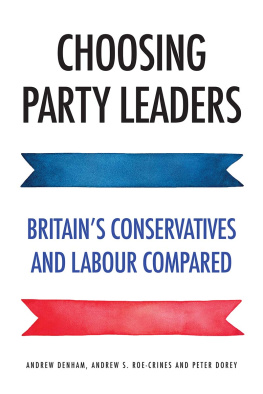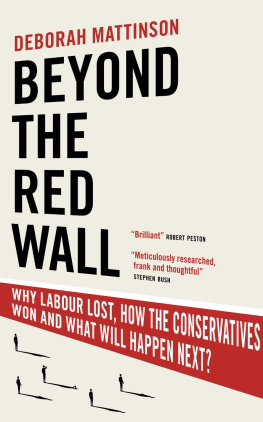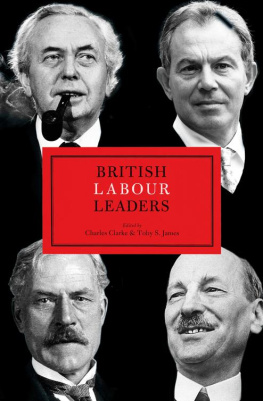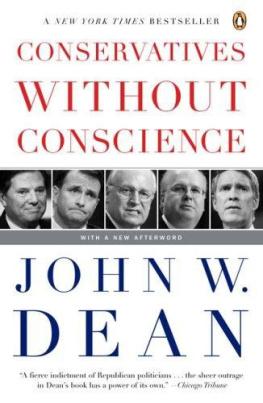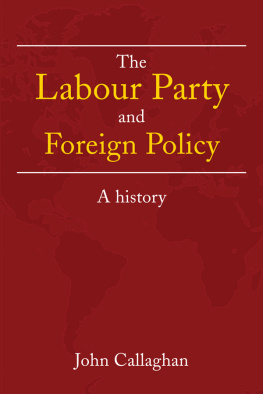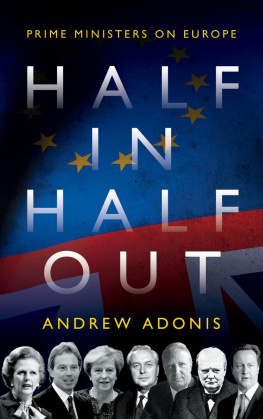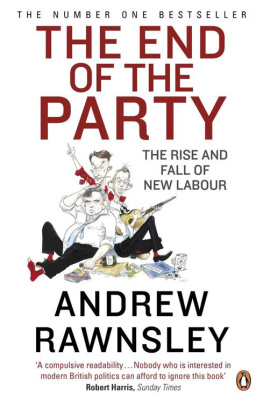Copyright Andrew Denham, Andrew S. Roe-Crines and Peter Dorey 2020
The right of Andrew Denham, Andrew S. Roe-Crines and Peter Dorey to be identified as the authors of this work has been asserted by them in accordance with the Copyright, Designs and Patents Act 1988.
Published by Manchester University Press
Altrincham Street, Manchester M1 7JA
www.manchesteruniversitypress.co.uk
British Library Cataloguing-in-Publication Data
A catalogue record for this book is available from the British Library
ISBN 978 1 5261 3486 8 hardback
First published 2020
The publisher has no responsibility for the persistence or accuracy of URLs for any external or third-party internet websites referred to in this book, and does not guarantee that any content on such websites is, or will remain, accurate or appropriate.
Typeset by
Servis Filmsetting Ltd, Stockport, Cheshire
The authors would like to pay tribute to our friends and families who have supported us throughout the research and writing processes, particularly Carl Bowler.
We would also like to thank the staff at the Labour History Archive and Study Centre, Manchester; The Bodleian Library, Oxford; and The Churchill Centre, Cambridge. Special thanks to The National Archives, Kew, for their unfailing efficiency in responding to numerous requests for archival materials over the last two years.
We would also like to thank the many members of the House of Commons and the House of Lords whom we approached to interview, particularly Neil (Lord) Kinnock for his very helpful comments.
Finally, we are especially grateful to Mark Stuart (University of Nottingham), Brendan Evans (University of Huddersfield) and Timothy Heppell (University of Leeds) for their very helpful comments on earlier drafts.
Finally, our gratitude must also be extended to Tony Mason and Tom Brook for their assistance.
How political parties choose their leaders and why they choose the leaders they do are questions of fundamental importance in contemporary parliamentary democracies. Reflecting the breadth and diversity of the discipline of political science, the academic literature on this subject ranges from studies of specific leadership contests involving a single party or country on the one hand, to large-scale, comparative studies of developments between countries on the other (Cross and Blais, ). In this book, our focus is on a single country, Britain, and the questions of how its two major parties, Conservative and Labour, have chosen their leaders and which factors have shaped their choices.
Since the early 1990s, six books have been published on the selection of British party leaders. Of these, two were single-party studies of the Conservative Party (Denham and OHara, ). By focusing exclusively on the two major parties in British politics and covering both in a single volume, this book differs from these studies.
By excluding third parties, this book is able to provide detailed coverage of how the Conservative and Labour parties have chosen their leaders and why, from their origins in the nineteenth and early twentieth centuries respectively to the present day. In so doing, it draws extensively on primary sources, including documents located in the Conservative and Labour party archives, interviews, and the diaries and memoirs of party leaders and leadership candidates themselves. More historical in its scope and methodology than previous studies, such as those by Punnett ( of this book, we examine the two leadership elections held by each party since 2015 and explain the changes to their selection procedures that preceded the elections of 2015 (Labour) and 2019 (Conservative).
As Cross and Blais (: 3) note, the selection of their leaders is one of the most important decisions parties make, and in parliamentary systems the choice is fully controlled by the parties themselves:
They decide when and how to select leaders, who to allow to seek the leadership, who to enfranchise in the selection, and how long leaders will serve; and there is generally no state regulation governing these decisions. In essence, parties are sovereign when it comes to selecting their leaders the men (and, rarely, women) who serve at the centre of our politics and government and from among whom we choose our Prime Ministers.
The most fundamental question when considering the politics of party leadership in parliamentary systems, they argue, is that of who selects the party leader and there is frequently an ongoing struggle between the parliamentary and extra-parliamentary groups within parties for influence in leadership politics. The question of who is empowered to participate in the process of selecting the leader speaks directly to the issue of where power lies in the party. As leaders play a key role in party and legislative decision-making, those who have [a] voice in their selection have indirect influence in these matters (Cross and Blais, : 14, 89).
As Stark (: 2) explains, British parties have employed, generally speaking, four different systems for choosing their leaders:

